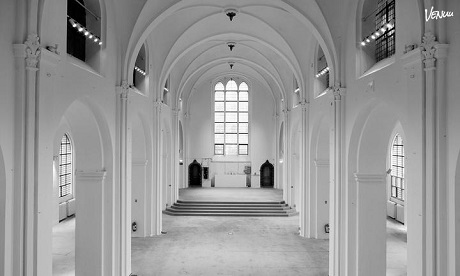Closed churches are likely to become closed for good in the not-too-distant future, says Monsignor Tomas Halik.
This won’t be because of outside forces like the coronavirus (COVID-19) pandemic, but because of the Church’s unwillingness to reform, he suggests.
Halik says we should take notice that in many countries churches, monasteries and seminaries have been emptying out for years.
“Don’t blame outside forces for empty churches.”
“Why do we keep on blaming external factors like the ‘tsunami of secularism’ instead of acknowledging that yet another chapter of the history of Christianity is coming to an end and that it is thus necessary to prepare for the next chapter?”
Halik, who was clandestinely ordained to the priesthood in 1984 during the former Czechoslovakia’s Communist dictatorship, says the Church should be what Pope Francis wants it to be: a “field hospital.”
“What the pope means by that is that it should not withdraw from the world in comfortable ‘splendid isolation’.”
“Instead, the Church could “venture out beyond its own limits and help those who are being physically, psychologically, socially and spiritually hurt.”
If the Church did that, it could begin to atone for allowing its representatives to violate people – even the most defenseless among them, he says.
Besides offering medical, social and charitable assistance – as it has done since its foundation – the Church must now go further and offer a diagnosis – just as a field hospital would.
Discerning the signs of the times also includes offering a type of “preventative medicine” aimed at immunizing society against the deadly viruses of fear, hatred, populism and nationalism, Halik says.
Rehabilitation is another aspect of healing the traumas of the past the Church needs to adopt, he adds.
Today’s empty churches because of the coronavirus lockdown might symbolically show us what the future would be like if the Church doesn’t seriously try to present the world with a totally different form of Christianity, he says.
“We have been far too convinced that the world – that is “the others” – must convert. And we have not thought about the need for our own conversion.”
Above all, we need to become ‘dynamic’ Christians rather than ‘static ones'”.
Now is the time to think deeply about Church reform while the churches are closed because of the pandemic, Halik suggests.
This will involve profound reform that turns to the core of the Gospel message so seekers can find “a source that will quell their thirst for the sense/meaning of life.”
It will mean Christians should stop trying to convert people and confine them to the Church’s existing institutions and mental limitations.
Instead, Christian communities should try to aim for “a School of Wisdom where free disputation and profound contemplation is sought.
“A healing power for our sick world could flow from such islands of spirituality and dialogue,” Halik says.
Source
Additional readingNews category: World.




